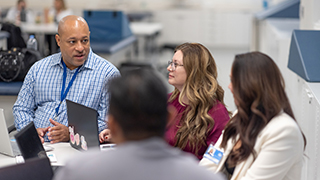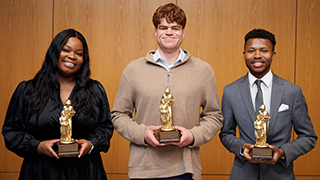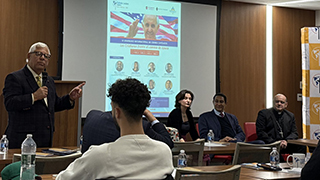Core III Courses Offer an Array of Topics - Seton Hall University
Thursday, February 18, 2021

The first course we will look at is offered by the Catholic Studies Program, which offers a wide array of fascinating Core III options, from Faith and Fashion to the Theology of Food, both extremely popular with students. CAST is a wonderful partner with the Core in the creativity and breadth of its Core III offerings. Ines Murzaku, Ph.D., Chair of the Catholic Studies Program, is enthusiastic about the commitment of CAST with the Core. She says, "CORE 1 and CORE 2 lay the foundations of the Catholic Intellectual Tradition. Catholic Studies/Core 3 is the place where the interaction with the disciplines happens. Catholic Studies/Core 3 specialized courses bring and take where cross-disciplinary enrichment happens. Catholic Studies/Core 3 courses bring the Catholic Intellectual Traditions to the disciplines and take the disciplinary expertise to the Catholic Intellectual Tradition. Catholic Studies/Core 3 courses are exactly this: theology in connection and interaction." She explains how this connection is important to Seton Hall's Strategic Plan: "Catholic Studies/Core 3 curricula is aligned with the new Strategic Plan 'Harvest Our Treasures' fulfilling Goal 1, 1.1 -- 'provide a broad liberal arts education that emphasizes both disciplinary knowledge and collaboration across the disciplines' and 1.4 'embrace fully Catholic vision of the University by encouraging and supporting multidisciplinary programs and fostering cooperation across disciplines and schools to strengthen and enhance Seton Hall's Catholic education mission.'"
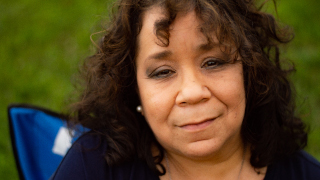
Maribel Landrau, M.A., Assistant Director of the University Core.
One of these courses, is the CAST/CORE cross-list created and taught by our own Assistant Director of the Core, Prof. Maribel Landrau, entitled The Church in Latin America. This course covers a wealth of material, from the important Mexican-based but now international devotion to Our Lady of Guadalupe to the iconic human rights spokesperson and recently canonized St. Oscar Romero of El Salvador. Prof. Landrau says of this course, "Catholicism in Latin America (CAST 3397) is a course that showcases the important role of the Roman Catholic Church in not only Latin America but in the Caribbean. The course addresses a general survey of the Church from the beginning of time to more modern history, the election of the first Pope from Latina America, Pope Francis! As part of the course objectives the students need to understand and analyze not only the cultural effects of the arrival of the Roman Catholic Church to Latin America, but also understand the Church during colonialism, independence and Church-state conflicts in the modern era….When I think of the Church in Latin America, I think immediately about Bishop Romero and one of his quotes: 'A church that doesn't provoke any crises, a gospel that doesn't unsettle, a word of God that doesn't get under anyone's skin, a word of God that doesn't touch the real sin of the society in which it is being proclaimed — what gospel is that?'"
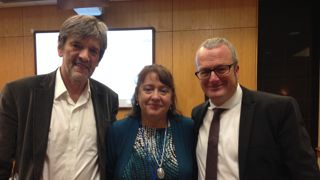
Martha Carpentier, Ph.D. (center) with Irish poet Michael O'Siadhail (on her right, the viewer’s left) and Irish historian Lorcan Collins (on her left, the viewer’s right).
Another wonderful Core III is offered through the English Department, and it was created and is taught by Martha Carpentier, Ph.D., Professor of English. This course covers "twentieth-century Irish writers publishing in English from the formation of the Irish National Theatre in 1899 through the Easter Rising of 1916 and War of Independence, founding of the Irish Free State, and Irish Civil War (1919-24), to the 'The Troubles' in Northern Ireland of the 1960s-80s, to the present day." Authors include James Joyce, Frank McCourt, Edna O'Brien and many others. According to the catalogue, "As a Signature 3 core course, the focus will continue to be on the Catholic intellectual tradition, as it developed in the crucible of twentieth-century Irish national and literary identity formation. The empowerment of a Catholic middle-class in the late nineteenth-century, after the Famine and Diaspora, has been central to Irish nationalism and the freedom of Ireland from British rule." Dr. Carpentier has taken students to Ireland several times and is passionate about the subject. Like all Core III classes, her course is inter-disciplinary in that it links literature to history as well as to the Catholic intellectual tradition. The photo of Dr. Carpentier (center) is from the Easter Rising Conference we hosted at Seton Hall in 2016, with Irish poet Michael O'Siadhail (on her right, the viewer's left) and Irish historian Lorcan Collins (on her left, the viewer's right).
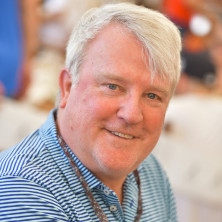
Prof. Chris Ryan of the Stillman School of Business.
A third Core III is offered by Christopher Ryan, Ph.D. of the Stillman School of Business, Global Business (of which there are many sections and versions). Prof. Ryan says of his particular course: "This Global Business course allows me the opportunity to bring the benefits of my forty plus years of experience in the worldwide Wine and Spirits industry as a Catholic businessperson and leader to the students of Seton Hall. We try to incorporate the core principles of Catholic Social Thought with the practical reality of our rapidly changing 21st century business environment. We attempt to offer solutions to some of the pressing problems of our world, such as income disparity and exploitation. We do this through selected readings and thoughtful discussions of the works of authors like Hernando de Soto, Jeffrey Sachs and Pietra Rivoli." Like his colleagues mentioned already, Prof. Ryan is deeply committed to making his class meaningful. He says, "It is crucial for me that we remain current, realistic, constructive, and practical in our approach."
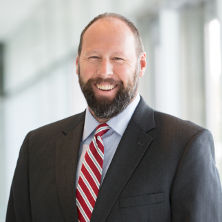
Todd Stockdale, Ph.D.
Finally, we look at a Core III, Catholic and Protestant Theology and Ethics in Dialogue, cross-listed with the Department of Religion, and taught by Core Fellow and Coordinator of Core I, Journey of Transformation, Todd Stockdale, Ph.D. He says, "throughout the course, students get to encounter familiar questions like: What does it mean to be Human? What is the nature of Love? What is the meaning / aim of life? What is moral good, what is sin? From where do we come, and where are we going? What is the relationship between knowledge through revelation and knowledge through reason? What is the relationship between belief and ethics? What is true? and What are the sources of truth?" Overall, Dr. Stockdale notes that "one of the aims of Catholic and Protestant Theology and Ethics in Dialogue is to analyze the extent to which Catholic and Protestant theological and moral thought overlap and mutually reinforce each other, while at the same time also paying due respect to the distinctiveness of each Christian tradition. We do this primarily by looking at the ways Catholic and Protestant thinkers have attempted to interpret, re-appropriate, or resist the theological-ethical landscape established by two of our Signature I and Signature II authors—Augustine of Hippo and Thomas Aquinas." It is a classic follow-up to our Core I and II classes
These are just a few of many Core III offerings available to students, and my hope is that, if any students are looking into Core III classes, these examples whet their appetite to look further. These courses are, as Dr. Carpentier said to me in an e-mail, among the most interesting and creative at the university, and we are fortunate to have these dedicated faculty teaching them.
Categories: Campus Life, Education


